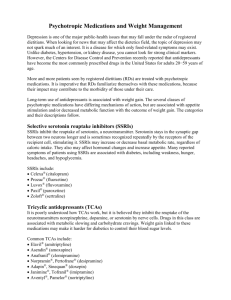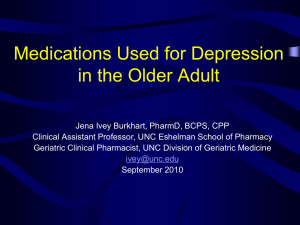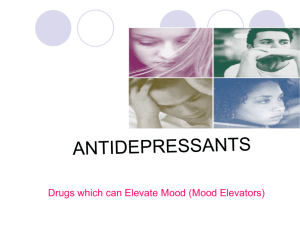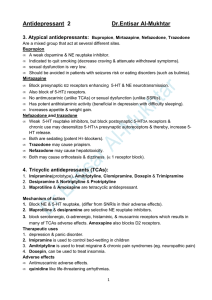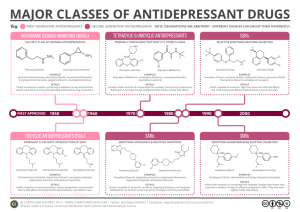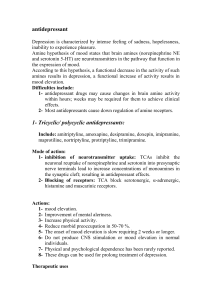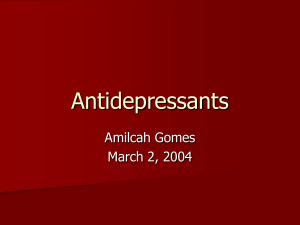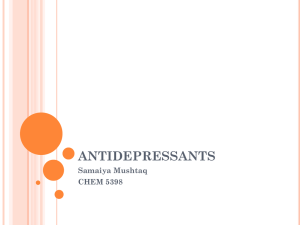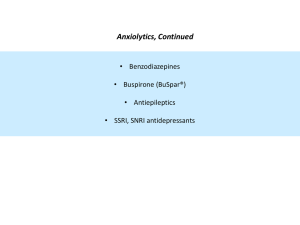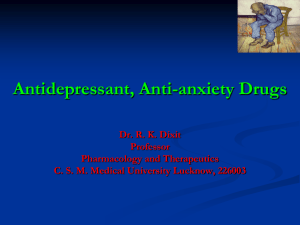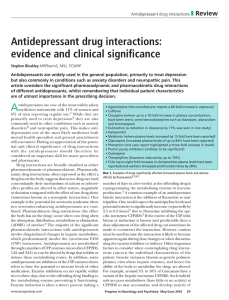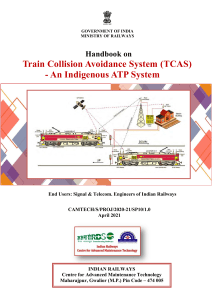Document
advertisement
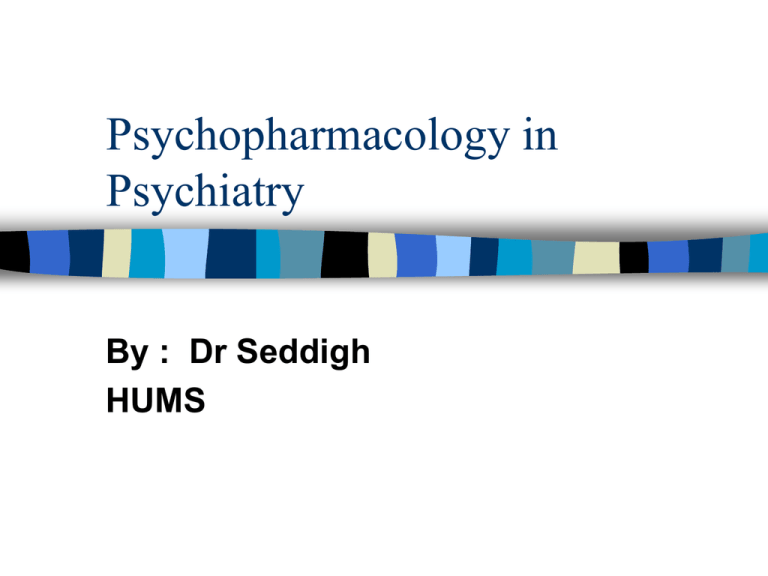
Psychopharmacology in Psychiatry By : Dr Seddigh HUMS Classification of antidepressants Tricyclics (TCAs) Monoamine Oxidase Inhibitors (MAOIs) Selective Serotonin Reuptake Inhibitors (SSRIs) Serotonin/Norepinephrine Reuptake Inhibitors (SNRIs) Novel antidepressants Cyclic Antidepressants Drug Trade name Daily dosage Amitriptyline Elavil* 100-200 mg Clomipramine Anafranil 150-200 mg Imipramine Tofranil* 100-200 mg Nortriptyline Aventyl* 75-150 mg Common Side effects of TCAs Mechanism Complication overdose Drug Interactions with Cyclic Antidepressants Drug Alcohol Antiparkinsonians Antipsychotics Fluoxetine(Prozac) Phenobarbitol Sedatives Antidepressants Indications TCAs effective & unacceptable Lethal in overdose QT lengthening Selective Serotonin Reuptake Inhibitors (SSRIs) Presynaptic reuptake Anxiety or depressive sx Side effects Overdose Discontinuation syndrome The SSRI antidepressant Drug Trade name Daily dosage/starting Fluoxetine Prozac 10-80 mg/20 mg Paroxetine Paxil 10-60 mg/ 20 mg Sertraline Zoloft 50-200 mg/50 mg Paroxetine (Paxil) – half life & metabolite – Sedating – CYP2D6 inhibition – Complication – discontinuation syndrome Sertraline (Zoloft) – interactions – Short half – Less sedating – absorption – GI adverse Fluoxetine (Prozac) – Long half-life – Initially activating – taper someone – hepatic illness – interactions – increase anxiety and insomnia – induce mania Antidepressants MAO Inhibitors Drug Trade name Daily dose Isocarboxazid Marplan 45-90 mg Phenylzine Nardil 10-30 mg Tranylcypromine Parnate 10-30 mg Foods & Drugs to be avoided Foods Drugs Aged cheeses Beer Broad-bean pods Caffeined beverages Canned figs Amphetamine Cocaine Decongestants Epinephrine L-dopa Overview of antidepressants 1st choice weeks effective → TCAs Abrupt withdrawal TCAs MAOIs “tyramine” TCAs to MAOIs Monoamine Oxidase Inhibitors (MAOIs) Bind to monoamine oxidase effective Side effects Hypertensive crisis MAOIs cont. Serotonin Syndrome Wait 2 weeks Fluoxetine Overview of antidepressants 1st choice weeks effective → TCAs Abrupt withdrawal TCAs MAOIs “tyramine” TCAs to MAOIs Serotonin/Norepinephrine reuptake inhibitors (SNRIs) v/s TCAS Indication Venlafaxine (Effexor) – interactions – geriatric – diastolic BP. – nausea – discontinuation – QT prolongation – Sexual side Duloxetine (Cymbalta) depression Novel antidepressants Mirtazapine (Remeron) Pros – Different mechanism of action may provide a good augmentation strategy to SSRIs. Is a 5HT2 and 5HT3 receptor antagonist – Can be utilized as a hypnotic at lower doses secondary to antihistaminic effects Cons – Increases serum cholesterol by 20% in 15% of patients and triglycerides in 6% of patients – Very sedating at lower doses. At doses 30mg and above it can become activating and require change of administration time to the morning. – Associated with weight gain (particularly at doses below 45mg Buproprion (Wellbutrin) Pros – Good for use as an augmenting agent – Mechanism of action likely reuptake inhibition of dopamine and norepinephrine – No weight gain, sexual side effects, sedation or cardiac interactions – Low induction of mania – Is a second line ADHD agent so consider if patient has a cooccurring diagnosis Cons – May increase seizure risk at high doses (450mg+) and should avoid in patients with Traumatic Brain Injury, bulimia and anorexia. – Does not treat anxiety unlike many other antidepressants and can actually cause anxiety, agitation and insomnia – Has abuse potential because can induce psychotic sx at high doses Overview of antidepressants 1st choice weeks effective → TCAs Abrupt withdrawal TCAs MAOIs “tyramine” TCAs to MAOIs Anxiolytics Used to treat many diagnoses including panic disorder, generalized Anxiety disorder, substance-related disorders and their withdrawal, insomnias and parasomnias. In anxiety disorders often use anxiolytics in combination with SSRIS or SNRIs for treatment. Benzodiazapines Used to treat insomnia, parasomnias and anxiety disorders. Often used for CNS depressant withdrawal protocols ex. ETOH withdrawal. Side effects/cons – – – – – – Somnolence Cognitive deficits Amnesia Disinhibition Tolerance Dependence Drug Alprazolam (Xanax) Dose Equiva lency (mg) 0.5 Peak Blood Level (hours) Elimination HalfLife1 (hours) 1-2 12-15 Rapid oral absorption 2-4 15-40 Active metabolites; erratic bioavailability from IM injection 1-4 18-50 Can have layering effect 1-2 20-80 Active metabolites; erratic bioavailability from IM injection 1-2 40-100 Active metabolites with long halflives 1-6 10-20 No active metabolites 2-4 10-20 No active metabolites 2-3 10-40 Slow oral absorption 10.0 Chlordiaze poxide (Librium) Clonazepam (Klonopin) 0.25 5.0 Diazepam (Valium) Flurazepam (Dalmane) 30.0 Lorazepam (Ativan) 1.0 Oxazepam (Serax) 15.0 Temazepam (Restoril) 30.0 Triazolam (Halcion) 0.25 1 2-3 Comments Rapid onset; short duration of action Buspirone (Buspar) Pros: – Good augmentation strategy- Mechanism of action is 5HT1A agonist. It works independent of endogenous release of serotonin. – No sedation Cons: – Takes around 2 weeks before patients notice results. – Will not reduce anxiety in patients that are used to taking BZDs because there is no sedation effect to “take the edge off.
